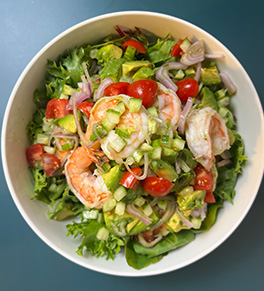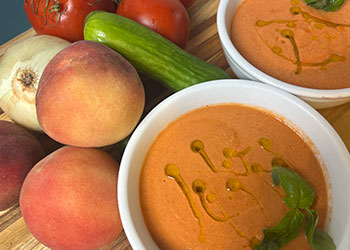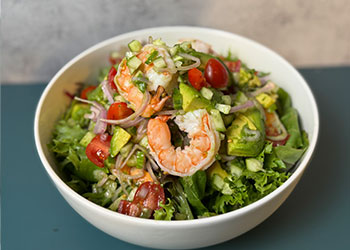Chill eats, no cooking required

Shrimp and avocado salad is a "perfect choice for a light, refreshing, nutritious meal,” says Katie Rankell, UCI Health registered dietitian and director of the Weight Management Program. All photos by Jessica VanRoo.
Summer’s bounty of fresh produce lends itself to lighter, warm-weather meals.
No-heat dishes are especially beneficial this time of year because raw fruits and vegetables are hydrating, keeping our bodies cool.
Recipes for salads, cold soups, wraps and smoothies are typically quicker to prepare, too, making them convenient for busy summer days when you’d rather spend time outside than in a hot kitchen. They’re also ideal as we gear up for the back-to-school rush.
Seasonal produce is usually picked at peak ripeness, giving your meals enhanced flavors and more variety. It also tends to be more affordable, especially when purchased at a local farmer’s market.
This month, Jessica VanRoo, executive chef of the Susan Samueli Integrative Health Institute, part of UCI Health, gathered some of summer’s most plentiful crops — tomatoes, cucumbers, peaches, herbs and leafy greens — for a unique spin on a light, invigorating soup and salad combination that will help you beat the heat.
Tomato, peach and basil gazpacho
 Gazpacho — the best known of Spain’s chilled soups — is not only a refreshing summer dish, but it is also a low-calorie energizer that will keep you calm, cool and collected.
Gazpacho — the best known of Spain’s chilled soups — is not only a refreshing summer dish, but it is also a low-calorie energizer that will keep you calm, cool and collected.
Tomatoes are the base of any authentic gazpacho and they happen to be packed with essential nutrients like vitamin C, potassium and folate.
They also contain the potent antioxidant lycopene, which is linked to a reduced risk of heart disease and certain cancers.
Mixing in fresh peaches ups the vitamin, mineral and antioxidant count even more.
“Peaches add natural sweetness and are loaded with vitamins A and C, along with fiber to support your digestive system,” says Katie Rankell, registered dietitian and director of the UCI Health Weight Management Program.
Jump to recipe
Cucumbers — which are 96% water — are super hydrators. They also offer the anti-inflammatory compounds beta-carotene, fisetin and cucurbitacin, which help protect cells from oxidative damage.
The sweet onions or shallots in this soup deliver a dose of quercetin — a plant compound known to support immune function. They also contain powerful antioxidants, including allicin, a bioactive compound formed when they are crushed or cut. Allicin — which is naturally antifungal, antibacterial, anti-parasitic and anti-viral — is especially beneficial to the gut microbiome.
Basil lends a slight peppery flavor and is a good source of nutrients that play a vital role in bone health and blood clotting, including vitamins A, C and K, manganese, copper, calcium, iron, folate, magnesium and heart-healthy omega-3 fatty acids.
“Pairing sweet heirloom tomatoes with juicy summer peaches in this chilled soup is the soothing balm you didn’t know you needed!” Rankell says.
Shrimp and avocado salad
 Plant-based meals give your body the fuel it needs for optimal health. But did you know that how you prepare fruits and vegetables plays a vital role in releasing their nutrients so your body can best absorb them?
Plant-based meals give your body the fuel it needs for optimal health. But did you know that how you prepare fruits and vegetables plays a vital role in releasing their nutrients so your body can best absorb them?
For instance, the cherry tomatoes in this recipe contain lycopene and beta-carotene. But studies show your body can’t tap into these powerful antioxidants without a little fat — like a dressing that contains a bit of olive or avocado oil.
This rich and delicious salad has a dressing made with extra-virgin olive oil, a reliable source of heart-healthy fats known to reduce inflammation and improve cholesterol levels. Olive oil is also rich in antioxidants, such as vitamin E, which protect the body from cellular inflammation.
Shrimp is a great source of lean protein, essential for muscle growth and repair, while also being low in calories and fat. They also contain vital minerals like iodine, zinc and selenium, which promote thyroid function and immune health, as well as omega-3 fatty acids.
Jump to recipe
Avocados, considered a superfood, offer another trifecta of health benefits. They are rich in monounsaturated fats that help lower LDL ("bad") cholesterol and increase HDL ("good") cholesterol, lowering your risk of heart disease. They also contain the antioxidants lutein and zeaxanthin, which are beneficial for eye health, and vitamin K, which is essential for calcium absorption and bone strength.
Even the splash of lemon juice boosts this recipe’s vitamin C intake, strengthening the immune system and enhancing skin health, while honey or agave adds a natural sweetness to balance the acidity of vinegar and mustard.
“The combination of ingredients in this crisp, hearty salad supports cardiovascular, digestive and immune health, making it a perfect choice for a light, refreshing, nutritious meal,” says Rankell.
Related stories
- Barbecue's unsung hero: Food safety ›
- Getting the most from your summer harvest ›
- Quick and adventurous global cuisine ›
- Nourishing the ADHD brain ›




